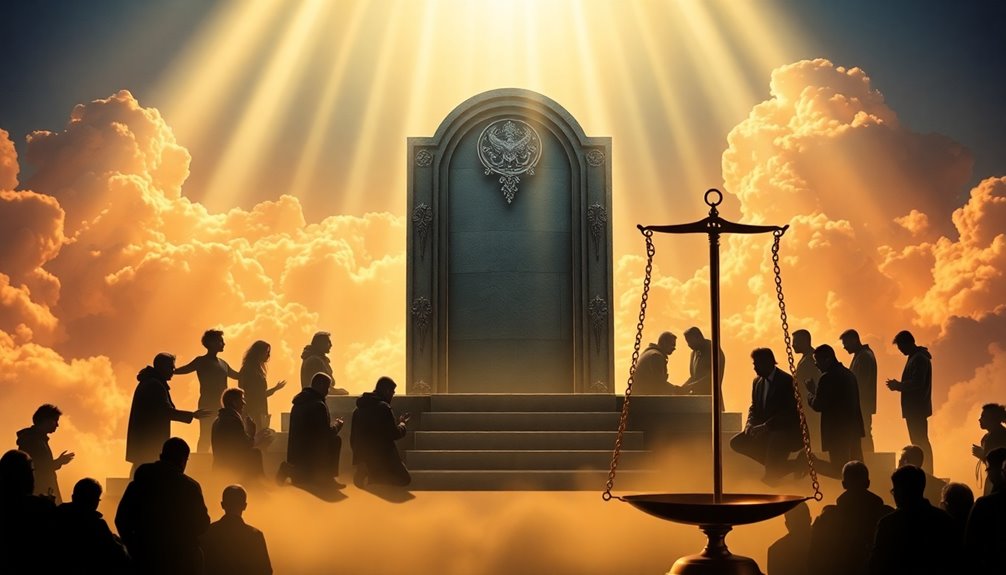The Judgment Seat of Christ, or Bema, is an important event for believers where you'll account for your works. It emphasizes faithfulness and the quality of your actions, focusing on rewards rather than punishment. Scripture like 2 Corinthians 5:10 highlights that all believers will be evaluated, with rewards given based on the service you've provided during your life. This moment encourages you to live a life that pleases God and reflects your dedication. Understanding its true purpose can shift your perspective on daily choices and motivations. Discovering more about this significant event will inspire deeper engagement with your faith.
Key Takeaways
- The Judgment Seat of Christ, or Bema, assesses believers' works for rewards, focusing on faithfulness rather than punishment.
- Scriptural references like 2 Corinthians 5:10 and 1 Corinthians 3:10-15 outline personal accountability and the evaluation of deeds.
- Common misconceptions include viewing it as punitive; instead, it emphasizes commendation and the quality of service rendered.
- Daily reflection and accountability are vital for aligning life with God's expectations, impacting eternal rewards at the Judgment Seat.
- Eternal rewards, such as crowns, are based on the quality of works, motivating believers to serve diligently and effectively.
Introduction

In the future, you'll stand before the Judgment Seat of Christ, also known as the Bema, where you'll account for your works as a believer. This event is significant because it's your opportunity to receive rewards from Jesus Christ for the life you've lived.
Unlike the Great White Throne Judgment, which deals with eternal condemnation for unbelievers, the judgment seat of Christ focuses on the faithfulness and quality of your works.
During this evaluation, your actions will be assessed based on their substance. Enduring works will earn you crowns and other rewards, while those lacking depth will be burned away, leaving only what truly matters.
It's a moment that emphasizes the importance of living a life aligned with God's purposes in anticipation of this day, especially after the rapture of the church.
As you prepare for this moment, remember that your time on earth is an opportunity to serve God and grow in your faith.
The rewards you'll receive aren't just for your benefit but also a testament to God's grace and your commitment to Him as a believer. Embrace this knowledge and let it inspire you to live purposefully.
Scriptural Basis for Judgment

When you think about the Judgment Seat of Christ, it's essential to recognize the primary Bible references that lay the foundation for this doctrine.
Scriptures like 2 Corinthians 5:10 and Romans 14:10-12 clearly outline the accountability and evaluation believers will face.
Primary Bible References
Several key Bible passages provide a clear scriptural basis for the Judgment Seat of Christ. 2 Corinthians 5:10 directly states that all believers will appear before this judgment to receive rewards based on their actions during their lifetime.
In 1 Corinthians 3:10-15, Paul elaborates on how the quality of each believer's deeds will be tested by fire, determining its worthiness for reward. This emphasizes that not only will you be judged, but the nature of your work will matter significantly.
Moreover, Romans 14:10-12 stresses personal accountability, insisting that each believer will give an account of themselves to God. This highlights the individual nature of the Judgment Seat, where you'll stand before Christ and assess your life.
Additionally, Matthew 16:27 reinforces that the Son of Man will return in glory to reward each person according to their deeds, affirming the basis for this essential judgment.
Finally, Revelation 22:12 indicates that Jesus will bring His rewards with Him, underscoring the importance of faithful service and the ultimate recognition you'll receive at the Judgment Seat.
Secondary Bible References
Multiple passages throughout the New Testament further reinforce the concept of the Judgment Seat of Christ. In 2 Corinthians 5:10, you see that all believers will appear before this judgment to give an account for their deeds, whether good or bad. This emphasizes your personal responsibility and the eternal consequences of your actions.
In 1 Corinthians 3:12-15, Paul explains that your works will undergo a test by fire, revealing what truly endures. The quality of your contributions to God's kingdom matters, as they determine your reward.
Likewise, Romans 14:10-12 stresses that each believer will give an account to God, highlighting the individual nature of this judgment.
Jesus underscores the significance of these rewards in Matthew 16:27, where He promises to reward each person according to their works.
Finally, in Revelation 3:11, you're reminded not to let your crowns be taken away, reinforcing the importance of holding fast to your faith.
Together, these references paint a clear picture: your actions carry weight, and the Judgment Seat of Christ will reveal the eternal implications of your life's work.
Ancient Greek Judicial Practices

In ancient Greece, the agora served as a bustling center for public life, where judicial practices unfolded before the eyes of the citizens. The bema, or judgment seat, was a raised platform where judges would sit, listening to trials and rendering verdicts. These trials involved a jury of citizens, randomly selected, who played a crucial role in determining the outcomes based on the arguments presented.
Litigation in this era heavily relied on oratory skills, as lawyers, known as rhetors, delivered persuasive speeches aimed at swaying the jury's opinions. The power of rhetoric was essential; a well-crafted argument could mean the difference between freedom and punishment.
During these proceedings, the public spaces of the agora buzzed with anticipation, as citizens gathered to observe the unfolding drama of justice.
Punishments varied widely in ancient Greek courts. Depending on the gravity of the offense and the jury's verdict, consequences could range from fines and exile to severe penalties like death.
This public nature of judicial practices not only emphasized the importance of fairness but also highlighted the role of community in the administration of justice.
Judgment's Purpose for Believers

The Judgment Seat of Christ acts as a pivotal moment for believers, focusing on how their lives and actions align with God's purpose. This evaluation occurs after the rapture, emphasizing the quality of your works rather than your salvation status.
At this Judgment Seat, you'll stand before the righteous Judge, and your faithful service will be assessed based on the deeds you've performed while in the body.
The purpose of this judgment is to encourage you to live a life pleasing to God, highlighting accountability in your daily choices. Every decision carries eternal implications, reminding you that what you do matters.
Rewards, such as crowns for your commitment to Christ, await those who've served faithfully (2 Timothy 4:8; James 1:12). However, be aware that unworthy works may lead to loss of rewards (1 Corinthians 3:12-15).
Ultimately, the Judgment Seat serves as both a motivation and a reminder. It inspires believers like you to strive for excellence in your Christian walk, knowing that your actions today will bear fruit in eternity.
Judgment Seat's Significance Misunderstood

You might be surprised to learn that the Judgment Seat of Christ isn't about punishment, but rather about evaluating your works for rewards.
Many Christians misinterpret its nature, fearing exposure of their sins instead of recognizing it as an opportunity for commendation.
Understanding these misconceptions can help you approach this event with the right mindset and purpose.
Debunk Common Misconceptions
Misconceptions about the Judgment Seat of Christ, or Bema, often cloud its true purpose and significance. Many people mistakenly view this Judgment Seat as a place of punishment. In reality, it's solely for evaluating believers' works and bestowing rewards, not determining salvation status. Romans 8:1 reassures you that there's no condemnation for those in Christ, emphasizing that your sins are forgiven and forgotten.
Another common myth is that all believers will receive the same rewards. Scripture shows that rewards vary based on the quality of each person's works, as highlighted in 1 Corinthians 3:14-15.
It's also crucial to understand that the Judgment Seat isn't just about actions; it examines the motives behind those actions, as noted in 2 Corinthians 5:10.
This understanding of the Judgment Seat serves as an incentive for faithful living, encouraging you to use your God-given resources effectively to earn eternal rewards, as stated in Matthew 5:12.
Misinterpretation of Judgment's Nature
At the heart of the Judgment Seat of Christ lies a significant misunderstanding about its true nature and purpose. Many think of the Judgment Seat as a place of punishment, but it's actually a platform for evaluating believers' works for rewards. This misinterpretation overlooks the crucial distinction between salvation and accountability; your eternal destiny is already secure in Christ (Romans 8:1).
You might worry that all your actions will be publicly displayed, leading to fear of shame. However, the truth is that this judgment focuses on the quality of your works, not their quantity. Enduring works will be rewarded, while those lacking substance will simply be burned away (1 Corinthians 3:12-15).
The pursuit of rewards isn't self-serving; it's about glorifying God through your faithful service (2 Timothy 4:8).
Understanding the Judgment Seat in this light frees you from the anxiety of condemnation. Instead, it encourages you to strive for faithfulness, knowing you won't suffer shame for your forgiven sins (Hebrews 10:17; 1 John 2:28).
Embrace this truth, and let it motivate you to live a life that truly glorifies God.
Daily Accountability in Faith

Every day, you have the opportunity to reflect on your actions and align them with your faith.
Joining group discussions can help keep you accountable, allowing you to share experiences and insights that strengthen your spiritual journey.
Embracing this daily practice not only prepares you for the Judgment Seat of Christ but also deepens your commitment to living out God's purpose.
Daily Reflection on Actions
Engaging in daily reflection on your actions is essential for nurturing your spiritual growth and accountability in faith. For believers, this practice helps assess your spiritual condition and prepares you for your eventual appearance before the Judgment Seat of Christ. Each day, take time to acknowledge your actions and motives, fostering a deeper commitment to fulfilling God's purposes without regrets.
The quality of your daily choices carries eternal implications, as they'll be evaluated for rewards or loss at the Judgment Seat. By reflecting regularly, you align your life with divine expectations, emphasizing accountability for how you steward your time and resources.
It's easy to get caught up in daily distractions, but intentional reflection helps you stay focused on what truly matters. Incorporating prayer and spiritual teachings into your daily routine can enhance your readiness for the Judgment Seat.
This process promotes a lifestyle that honors God and encourages growth in your faith. Remember, daily reflection isn't just about assessing past actions; it's about shaping your future decisions to live in a way that pleases Him and prepares you for eternal life.
Group Accountability Discussions
Group accountability discussions play a vital role in your spiritual journey, fostering an environment where you can openly assess your faith and actions with others. Engaging with fellow believers in these discussions encourages honest self-examination, allowing you to evaluate your spiritual condition regularly. This practice is essential as you prepare for the Judgment Seat of Christ, where your daily choices will have eternal implications.
By prioritizing time with God and committing to serve your local church, you align your actions with God's purpose. These group discussions not only provide mutual encouragement but also reinforce accountability among believers, helping you stay focused on fulfilling God's plan without regrets.
The rewards at the Judgment Seat are tied to how well you build with lasting materials, like gold, silver, and precious stones, which will endure the test of fire. Regular self-examination and open dialogue within your group empower you to seek guidance from spiritual teachings, ensuring that you're not just drifting through your faith journey.
Instead, you actively cultivate a deeper relationship with God, leading to a fulfilling and purpose-driven life.
Eternal Rewards for Faithful Service

At the Judgment Seat of Christ, believers will find their faithful service evaluated, highlighting the significance of their works in light of eternity. This evaluation isn't about salvation—you're secure in Christ—but rather about the quality of your service.
The rewards you receive can take the form of various crowns, such as the crown of righteousness for those who love His appearing and the crown of life for enduring trials.
Your works will be tested by fire, revealing what endures and what doesn't. Those faithful acts that stand the test will earn you eternal rewards, while those that falter may lead to a loss of reward.
It's crucial to approach your life with diligence, striving for full rewards, as some may experience loss even while being saved. Remember, your actions and motives matter; they'll be examined to ensure they align with God's purposes.
The pursuit of eternal rewards serves as a powerful motivation for you to live a life pleasing to God. As you engage in faithful service, keep your eyes on the prize, eager to hear, "Well done, good and faithful servant."
Additional Resources

To support your understanding of the Judgment Seat of Christ, a variety of resources are available that can deepen your knowledge and encourage your spiritual growth. Books and articles focusing on the Bema Seat often explore how believers will receive rewards based on their earthly works.
Look for materials that discuss the significance of faith in Christ and how it impacts your evaluation at this unique tribunal. Scriptural commentaries can provide insight into relevant passages, like 2 Corinthians 5:10 and 1 Corinthians 3:10-15, helping you grasp the importance of living a life that honors God.
Online courses or lectures about eschatology may also enrich your understanding of the Judgment Seat of Christ and its distinction from the Great White Throne Judgment. Additionally, joining Bible study groups focused on eternal rewards and faithful service can foster discussions and accountability among fellow believers.
Engaging with these resources can motivate you to reflect on your actions and strive for rewards that await you, emphasizing that while all believers will be judged, your sins are forgiven through faith in Christ, paving the way for an eternal reward.
Frequently Asked Questions
What Is Meant by Judgment Seat of Christ?
The term "judgment seat" refers to a place where decisions are made and evaluations occur.
In various contexts, it signifies a point where actions and behaviors are assessed. You might think of it as a platform where the consequences of one's choices are laid bare, prompting reflection and accountability.
This idea encourages you to consider the impact of your actions, emphasizing the importance of living with intention and integrity in all areas of life.
What Is the Difference Between the Judgment Seat of Christ and the Great White Throne?
The main difference between the Judgment Seat and the Great White Throne lies in their purpose and audience.
At the Judgment Seat, believers' works are evaluated for rewards, focusing on their faithfulness in service.
In contrast, the Great White Throne determines the eternal fate of unbelievers, based on their rejection of Christ.
While the first is about accountability and rewards, the second brings final judgment and separation from God for those not found in the Book of Life.
Who Must Appear Before the Judgment Seat of Christ?
You must understand that every believer who's accepted Jesus during the church age will appear before this judgment.
It's a moment where you'll give an account of your actions and the motives behind them. This isn't a matter of condemnation but rather an evaluation of the quality of your works.
It's crucial to recognize your personal accountability for how you've lived your life and the impact of your faith on others.
Will Christians Face the Judgement Seat?
Yes, you'll face a judgment as a Christian.
This isn't about your salvation but rather an evaluation of your works and service. You'll be assessed on what you've done, and this will determine your rewards in eternity.
Remember, your sins are forgiven, so there's no condemnation.
This opportunity motivates you to live faithfully, knowing that your actions today have lasting significance in your eternal life.










